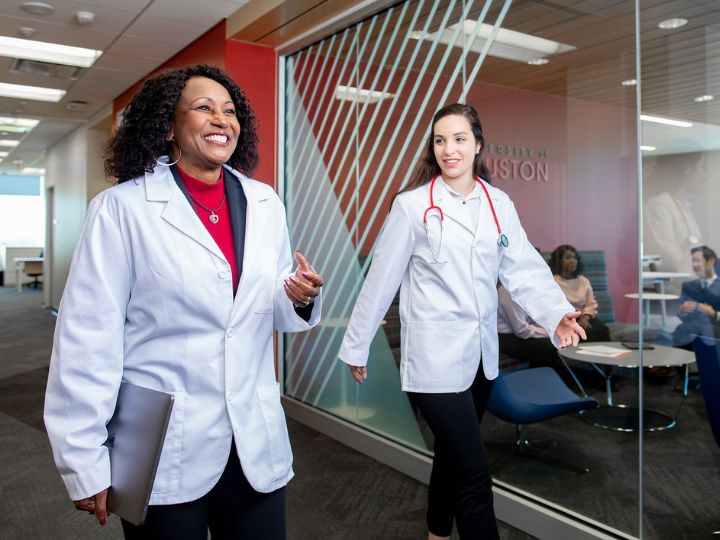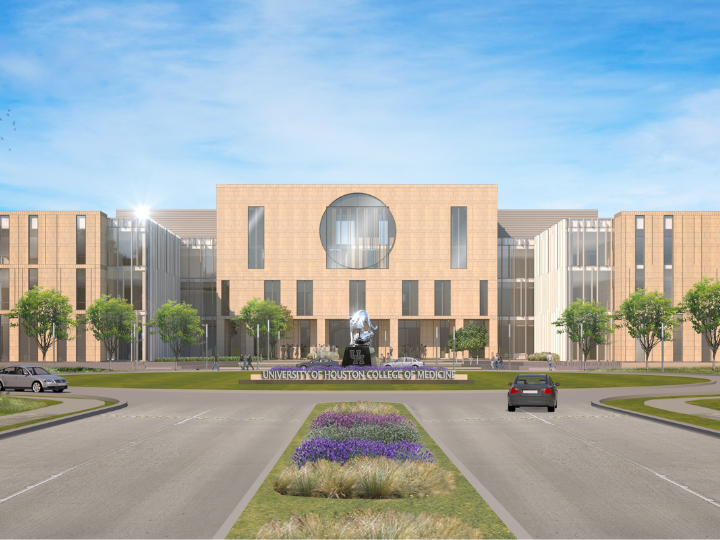

The University of Houston College of Medicine, founded last year on a distinct social mission to be accountable to society for improving the overall health and health care of Greater Houston, Texas and beyond, has received a $1 million grant from Bank of America to support the medical school’s commitment to increase primary care access in underserved urban and rural communities.
Texas faces a critical primary care physician shortage, especially in low-income and minority communities which often lack access to a regular source of care and have gaps in preventative care, which leads to higher rates of sickness, hospitalization and death. The COVID-19 pandemic has only amplified these longstanding health disparities.
Bank of America’s leadership grant strengthens the medical school’s ability to train more primary care doctors from diverse racial and ethnic backgrounds to practice in those underserved areas by enhancing academic programs and community outreach. The UH College of Medicine aims for at least half of its graduates to choose to practice primary care in Texas – only about 20% of medical students nationwide choose primary care.
“Building equity and inclusion in our community is a strategic goal of the University, and we are grateful that Bank of America shares our vision for a more equitable health care system and society. Their generous support will help strengthen community health by educating future physicians to care for those who are underserved,” said Renu Khator, University of Houston president.
Bolstering the diversity of the physician workforce to mirror the communities they serve is also essential to achieving culturally competent health care. Of the 60 students in the medical school’s first two classes, 65% are underrepresented minorities in medicine and half come from a low socioeconomic background. In contrast, only 13% of all students accepted to U.S. medical school are Black or Hispanic/Latino.
“Bank of America recognizes the immediate need for increased access to health care, especially among underserved and minority populations across the country. This effort is particularly important in Houston, home to one of the nation’s most diverse populations and most well-renowned medical centers in the world,” said Hong Ogle, Bank of America Houston president. “We are aligned with the University of Houston and UH College of Medicine in their mission to advance racial equity in our community and truly value the opportunity to both support their work to serve residents in every corner of our city and build a robust, diverse pipeline of physicians and health care providers to address this critical need.”
In recognition of Bank of America’s leadership commitment, the main lobby of UH’s new three-story, 130,000-square-foot College of Medicine building, currently under construction on the UH campus, will be named after the company. The medical school building is scheduled to be completed next summer.
“Bank of America is taking action to address critical issues affecting our nation and we are incredibly thankful for their support in the area of health equity,” said Dr. Stephen Spann, founding dean of the UH College of Medicine. “By educating more primary care physicians, we can improve the overall health of communities and lower the economic burden of health care on our state and country.”
To fulfill its mission, the UH College of Medicine formed community working groups in Houston’s Third Ward and East End, both minority-majority communities near the UH campus. Medical school faculty and staff meet regularly with community leaders and residents to stay engaged and to identify areas of concern or need.
“The University of Houston is proud to ignite meaningful change in our city, state and beyond, especially with partners like Bank of America who are resolute in advancing equality and opportunity across the country,” said Eloise Brice, vice president for university advancement. “Their significant support strengthens the College of Medicine’s ability to train doctors who will serve those same communities for generations to come.”
Bank of America is focused on advancing racial equality and economic opportunity and supports nonprofit organizations working to improve health, jobs and re-skilling, and affordable housing, as well as providing support for minority-owned small businesses in local communities. Since last June, the company has committed more than $350 million in various investments in these areas of focus.